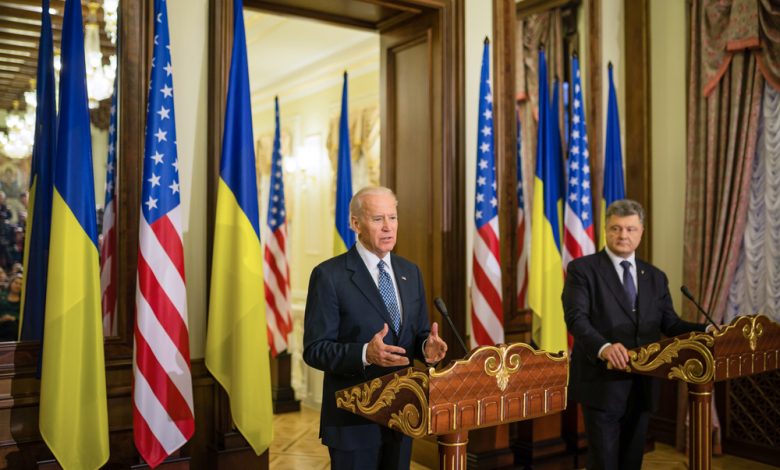
Since the fall of the Soviet Union, a weak but geopolitically important Ukraine had become a jump ball between Western countries and Russia. Unfortunately, when the chips were down in 2019, Democrat-leaning bureaucrats chose to protect Democrat Joe Biden from a corruption investigation, rather than protect Ukraine from corrupt, pro-Russian oligarchs. How did this happen?
In November 2013, when Ukrainian President Viktor Yanukovych abruptly pulled out of an EU deal that would have given the country increased prosperity and peace, a wave of Euromaidan anti-corruption protests threw the regime out of Ukraine. Prior to this revolution, U.S. President Obama and Secretary of State Hillary Clinton had urged the country not to heavily arm because the United States and NATO would provide strong defense against foreign aggression.
Russian President Vladimir Putin, seizing on an unarmed country temporarily in disarray due to Euromaidan, began marching to the strategically crucial Crimean Peninsula of Ukraine, a Black Sea chokepoint.
Did President Obama step up to protect Ukraine? Of course not. He cowered, as Putin likely sensed his weak rival would. Rather than provide much-needed weapons, Obama sent Meals Ready to Eat (MREs) and blankets, careful not to upset Putin by bringing actual U.S. personnel onto Ukrainian soil.
With Crimea under Russian control, Obama talked tough about fighting pro-Russian oligarchic corruption, appointing then-Vice President Joe Biden as his anti-corruption “point man.” The Vice President saw an opportunity to do great things, which appears now to have meant profiting greatly, through his son, from the same corruption he was supposed to fight.
On April 14, 2014, the UK Serious Fraud Office (SFO), with U.S. help, impounded $23 million that former ecology minister of Ukraine Mykola Zlochevsky, a shareholder of Burisma Holdings and a partner of notorious oligarch Igor Kolomoisky, was attempting to spirit out of the country. Two days later, Devon Archer, the business partner of Joe Biden’s son Hunter and then-Secretary of State John Kerry’s stepson Christopher Heinz, met for hours with Biden in the White House.
Soon after this meeting, Burisma announced the hiring of Archer and Hunter Biden for “corporate governance” services, following which Hunter Biden was paid a reported $83,000 per month. Thereafter, the looting continued by the new clients of Hunter Biden, including billions in foreign aid provided by his father and John Kerry, described elsewhere.
Where were our noble bureaucrats, dedicated to saving Ukraine from Russia and the oligarchs? Well, George Soros-connected, liberal Brookings Institute scholar Fiona Hill wrote a 2015 Washington Post op-ed praising Obama for his restraint in not provoking Putin in Crimea.
In early 2015, after the Biden-influenced country failed to ask for return of the $23 million, a frustrated British Court gave Burisma back its $23 million, which was promptly transferred to Cyprus. But this $23 million was small potatoes. In 2016, Joe Biden threatened to withhold a $1 billion aid package for Ukraine unless the country’s leaders fired Viktor Shokin, the prosecutor investigating Burisma Holdings. And so they did.
Soon thereafter, U.S. Ambassador to the Ukraine Marie Yovanovitch, a Soros protégé, denied a U.S. visa to Shokin, who wished to come to the United States to speak out about the Bidens’ corruption. She steered $4.4 million in foreign aid away from the prosecutor’s office and into AntAC, a private anti-corruption office supported by Soros. She also gave an oral “do not prosecute” list to prosecutor Yuriy Lutsenko. The succeeding U.S. Ambassador William Taylor sternly rebuked Lutsenko’s attempt to regain the funding he claimed was meant for his office.
FBI Director James Comey inserted a favorite agent to work with the American-supported National Anti-corruption Bureau (“NABU”). NABU then took over Lutsenko’s and Shokin’s prosecutions and made sure to dismiss all suits against Burisma, with nothing more than a token payment.
Then in the April 2019 Ukrainian presidential election, President Poroshenko was surprisingly defeated by Volodymyr Zelensky, thought to be more pro-Russian, and perhaps a protégé of Igor Kolomoisky, who owned the television network on which Zelensky had made a career as a comedian.
But when Zelensky was elected, Kolomoisky was no longer in Ukraine, having wisely fled after Poroshenko’s prosecutors had discovered $5.6 billion in losses on the books of his PrivatBank, 97% of the loans to companies associated with the bank owners. So, the United States had a limited window to persuade Zelensky to prosecute corruption with and see to it that Ukraine did not devolve to Russian control.
By late August, following a July 25, 2019 call with Trump, it appeared that Zelensky was finally prepared to investigate the Biden-centric corruption, involving Burisma and PrivatBank, which would then presumably keep Kolomoisky from returning to corrupt influence.
However, luckily for the Bidens, the bureaucratic calvary came to the rescue when the impeachment proceedings against President Trump began as a result of that July 25 call.
In October 2019, soft, pudgy, but elaborately beribboned and festooned in military dress uniform, Lieutenant Colonel Alexander Vindman told how he revealed the confidential July 25, 2019 Trump-Zelensky call to his friend (Eric Ciaramella, a CIA analyst claimedly specializing in Ukraine, and as well a staunch Clinton campaign supporter). Ciaramella “anonymously” became the “whistleblower” who claimed that investigating Biden corruption would be “interference” in the 2020 election, a trope swallowed whole by the credulous anti-Trump media.
Vindman testified to his shock that Trump did not actually repeat to Zelensky the State Department talking points to “root out corruption,” but instead tried to get Zelensky – horrors – to investigate the Bidens for corruption. Vindman also testified that he took his comfortable, secure job to “repay” America for his immigration to our country.
Fiona Hill, now with the National Security Council, testified about her worries that Trump was not strong enough against Russia. Marie Yovanovitch was praised, like Hill and Vindman, for being foreign-born yet patriotically accepting government employment. Ambassador Taylor, who had been a staffer for Democrat Senator Bill Bradley after his taxpayer-paid education at West Point, testified to his objections to Trump’s actions.
Taylor hectored Zelensky to stay away from Kolomoisky, but to no avail, given Trump’s lack of support from bureaucrats like Taylor.
While Trump was battered daily by the media, Kolomoisky knew the coast was now clear. With PrivatBank now reflated and solvent with $5.6 billion in IMF monies, Kolomoisky demanded that the bank be returned to him.
Now publicly aligned with Zelensky, Kolomoisky claimed that Ukraine had no choice but to swing to Russian influence and away from NATO, thereby losing Ukraine for the West. Was this due to Trump’s delay for several weeks of lethal weaponry previously denied by Obama for years? Or due to Biden-protected oligarchic corruption? Was it enabled in any way by a lack of moral courage of a left-leaning media supporting a left-leaning U.S. bureaucracy, neither of whose constituents had the decency to tell nonpartisan truths about matters of national security? We know the answers, and they do not speak well either for the media or those we entrust with our government.





Leave a Reply
Thank you for your response.
Please verify that you are not a robot.